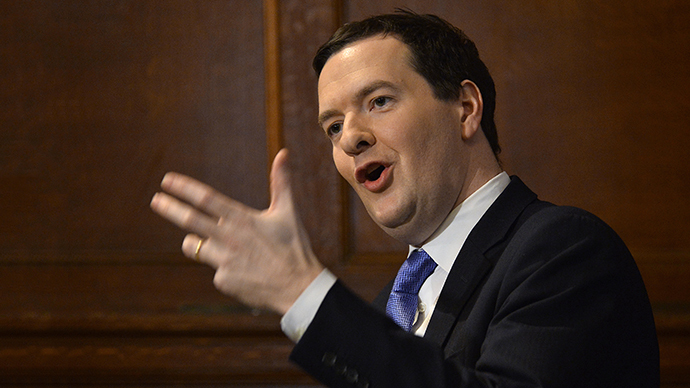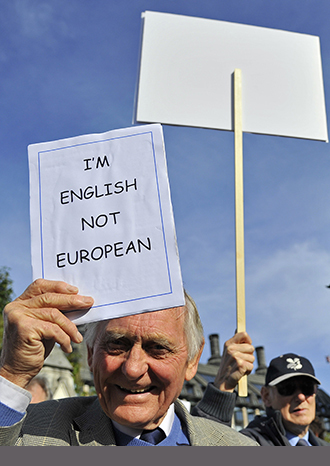Time for EU to rebalance – or face Brexit

Britain has had many issues with the European Union over the years but now things are clearly coming to a head, as business and the population feel increasingly isolated from Brussels.
Growth has deserted the declining EU. A heavily subsidized welfare system heavily influenced by large corporations and NGOs is driving Europe backwards. Individuals are left unable to improve society from the bottom up.
Entering a sixth year of widespread depression, the eurozone remains locked in a dizzying death spiral. Eurocrats claim the crisis is over, despite an absence of reforms to improve EU competitiveness. Vast legions of Mediterranean unemployed are ignored by Brussels. Eurostat number crunchers eagerly trumpet the faintest hint of growth but emerging markets are powering ahead. While the EU has stalled since 2008, the Indian economy has grown by one-third and China has grown by 50 percent. Forecasts suggest Europe’s share of global output will halve in the next 15 years. The old continent is not merely looking its age – it is positively decrepit: aging fast, producing less, increasingly uncompetitive and unsustainable.
Now the UK government is pushing a serious reform of the failing EU system, seeking to reboot the corporate/NGO focus to deliver efficiency, jobs and economic growth through less red tape and greater flexibility. Britain’s finance minister, George Osborne, has barely sparkled in office but at an Open Europe conference in London he grasped the mettle of reform as the EU increasingly alienates the majority of British citizens and businesses alike. There the chancellor said the UK could be forced to quit the European Union if the organization does not reform, adding that without such reform, the UK might “face a choice between joining the euro or leaving.”

The UK is looking enviously at the Anglosphere, inside and outside the British Commonwealth whose output is growing and with whom Britain’s natural trade links are being stymied by Brussels red tape. Meanwhile, as the EU pushes yet more financial regulations which will ultimately rob pensioners and blight investment, the UK, home to the world’s largest financial center, has increasingly had enough of the bloated, unaccountable, wasteful, Brussels monolith.
True British migrant worries may be overhyped (government statisticians note that diligent Poles, Latvians et al are actually net paying their way in the UK, helping reduce government borrowing cost by paying more tax than they take in benefits) but they remain central in various aspects of anti-EU sentiment. However Britain proudly revels in its open political debate and recoils at the likes of stage-managed press conferences in Europe where, say, the French media are tongue-tied when it comes to straightforwardly asking the truth about their philandering president. Likewise most European media politely ignore simple truths which UK media report such as the rather habitual reticence of auditors to sign off on EU accounts.
A clear divide between Britain and the aloof, incompetent, manipulative, undemocratic Brussels machine is growing. Moreover the British anti-EU movement is not made up of national socialist extremists like France or Greece. The UK Independence Party harbors many eccentrics but its core politics are measured and mainstream, appealing to traditional Labor and Conservative voters.
With Mediterranean unemployment above Great Depression levels, it is difficult to argue with the core eurosceptic logic: the EU is impoverishing its people, delivering economic destruction through ill-managed integrationist obsession. Thus Britain’s Conservative Party must respond to growing anti-EU sentiment inside and outside their government. Hence Mr. Osborne endorsing a radical reform agenda which is anathema to the totalitarian mentality prevalent in Brussels.
Britain is not alone. Mrs. Merkel bristles at many EU failings and is the keenest exponent of the 7/25/50 methodology: Europe has 7 percent of the world population, 25 percent of world output and 50 percent of the world’s welfare spending. Even if the economy was competitive with the Asian tigers, this would be utterly unsustainable.
Now Osborne has apparently realized the EU has no interest in negotiating without an explicit threat and indeed technically Britain must invoke article 50 of the Lisbon Treaty (specifically threatening withdrawal from the EU) to encourage serious negotiation. Otherwise a totalitarian Brussels will simply adhere to the status quo (until, like the Soviet Union, it simply ceases to exist). Then again, is Britain better off in a system which tacitly endorses 50 percent youth unemployment in Greece and Spain?
Besides, the UK trades more outside the EU than within: only tiny islands Malta and Cyprus trade less with the EU. The UK has a rich seam of trading with the Anglosphere and Commonwealth alone, which is ironically being stifled by Brussels’ red tape.
Like an alcoholic, Brussels is unaware it has a problem, buffered by the devotional support of multiple corporate/NGO/trade union groups co-opted by EU patrimony. Brussels is sleepwalking to Brexit.
The statements, views and opinions expressed in this column are solely those of the author and do not necessarily represent those of RT.
The statements, views and opinions expressed in this column are solely those of the author and do not necessarily represent those of RT.













